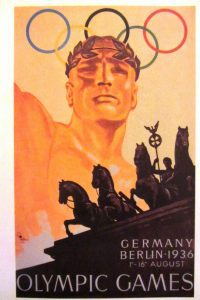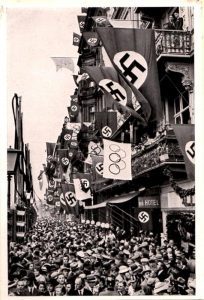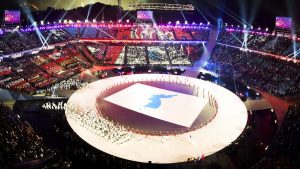The 1936 Olympics: A Global Stage for the Nazi Regime
Zoe Wright, Public Relations Intern at The Florida Holocaust Museum
In 1931, the International Olympic Committee announced that the 1936 Olympics would be held in Berlin, Germany. This choice recognized Germany’s inclusion in the world community after being isolated following World War I. The decision was made before Adolf Hitler was appointed Chancellor.
As experienced in the Winter Olympics in PyeongChang County, South Korea a few months ago, the Olympics have always acted as a spotlight for the host country to share its culture with the world. However, no one could have predicted that in 1936, the Olympics acted as a way for Nazi Germany to spread propaganda.
Nazi Minister of Propaganda, Joseph Goebbels convinced Hitler that the Olympics would be a great way to introduce the world to the “New Germany.” However, this spotlight did not stop them from banning Jews from participating in all sports clubs and facilities.

The Nazi regime did everything they could to camouflage their racist polices while hosting the Olympics. Propaganda was everywhere. From posters to magazine spreads to banners, the Nazis used imagery to compare Germany to ancient Greece. They wanted to symbolize that the German civilization was a direct heir of “Aryan” culture and appearance, such as blue eyes, blonde hair, and muscular physique. Joseph Goebbels ordered the press to speak favorably about the games. He censored the German press, radio, and film industries. Though impactful, the propaganda was not able to fool everyone. Nazi discrimination against Jewish athletes caused debate about participation in the Berlin Olympics.


There were movements to boycott the Berlin Olympics in the United States, France, Sweden, Great Britain, Czechoslovakia, and the Netherlands. One of the largest movements was the People’s Olympiad. The People’s Olympiad was organized in Spain and was to be held in Barcelona. 6,000 athletes from 49 countries registered for the event. The People’s Olympiad was supposed to include competitions in music, theatre, and dancing in addition to sporting events. Unfortunately, the People’s Olympiad never took place due to the start of the Spanish Civil War. No matter what the event, people will draw together to focus on the good in the world. Resistance to the 1936 Olympics shows us that good will can inspire people and give hope for a better tomorrow.
Jewish athletes from around the world boycotted the Olympics and the qualifying trials. Organizations such as the American Jewish Congress and Jewish Labor Committee were vocal in their support of a boycott. Another key leader in the movement to boycott the 1936 Olympics was Judge Jeremiah Mahoney, the president of the Amateur Athletic Union in the United States. He drew attention to the Olympic rule Germany had broken. The Olympic Committee forbids discrimination on race and religion. He said that participation in the Olympics would be equivalent to endorsing Hitler’s Reich.
Sports have the power to impact the world. From the Olympics to the World Cup, international competitions have been incredible for countries to come together. The Olympic Committee has taken this sentiment to heart. At the opening ceremony in South Korea, International Olympic Committee President Thomas Bach said, “We are stronger than all the forces that divide us.” South Korean President, Moon Jae-in said, “It was an ardent desire that the people of Korea aspired to host the Winter Games, the only divided nation in the world. It mirrors the Olympic spirit in its pursuit of peace.”

As we learn from the past, it is important to always remember what a huge platform sporting events provide in society. To learn more about the 1936 Berlin Olympics, please visit The Florida Holocaust Museum in St. Petersburg, Florida.
